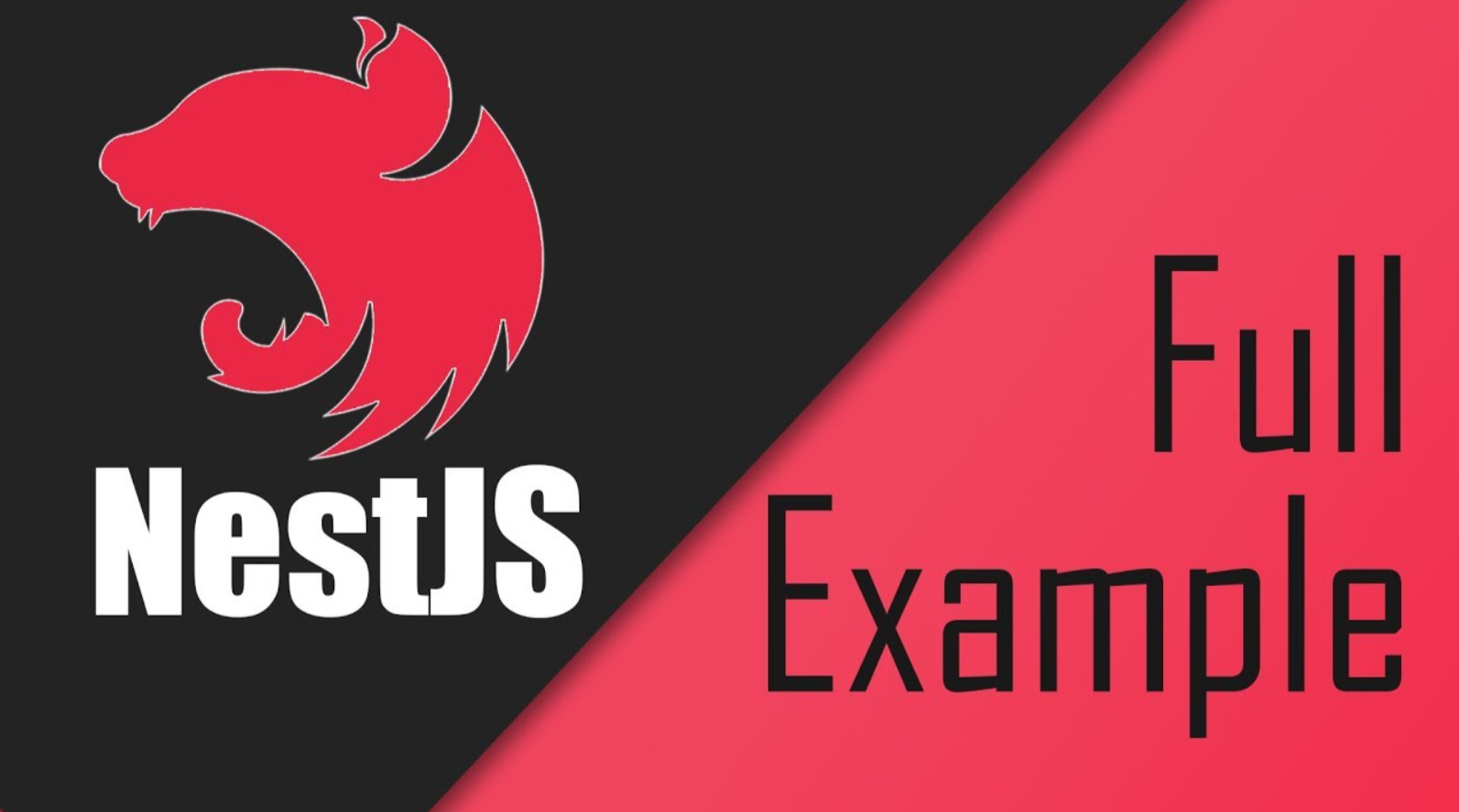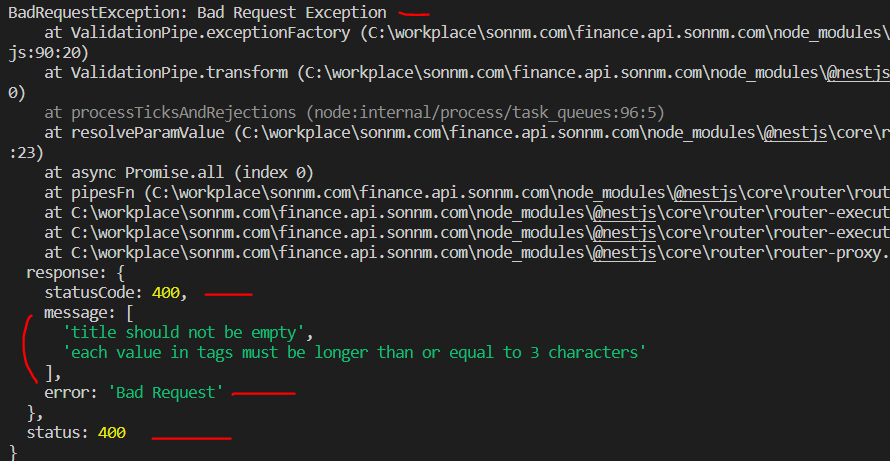
Nestjs Pipes
Post Date : 2022-08-04T10:46:09+07:00
Modified Date : 2022-08-04T10:46:09+07:00
Category: nestjs frameworks
Tags: nestjs
Note: All of demo source code you can find our in github nestjs boilerplate
What is Pipe?
A pipe is a class annotated with the @Injectable() decorator, which implements the PipeTransform interface
Pipes operate on the arguments being processed by a controller route handler.
Nest interposes a pipe just before a method is invoked, and the pipe receives the arguments destined for the method and operates on them
So that, we can use pipes in two typical use cases:
- Transformation : transform input data to the desired form
- Validation : evaluate input data and if valid, simply pass it through unchanged; otherwise, throw an exception when the data is incorrect
Let’s get back to our example
In NestJS we have some built-in pipes for transformation
- ValidationPipe
Let’s dive into this example
{
"title": {
"dataType": string,
"required": true,
"maxLength": 75,
"minLength": 1,
},
"description": {
"dataType": string,
"required": false,
"maxLength": 160,
},
"content": {
"dataType": string,
"required": false
},
"status": {
"dataType": enum,
"required": false,
"default": 1,
"enum": {pending:1, published:2, archived:3}, // can not be archived when creating
},
"tags": {
"dataType": Array[string],
"required": false,
"arrayMaxLength": 5,
"eachValidation": {
"minLength": 3,
"maxLength": 10,
}
}
}
Steps
- Install the required packages: class-validator and class transformer
- Create DTO class and defined constraints
- Use Pipe
You need to install the required packages before going further
npm i --save class-validator class-transformer
DTO : A Data Transfer Object is an object that is used to encapsulate data, and send it from one subsystem of an application to another
import { IsNotEmpty, IsOptional, MaxLength } from "class-validator";
export enum ExampleStatus {
pending = 1,
published = 2,
archived = 3,
}
export class ExampleDTO {
@MaxLength(75)
@IsNotEmpty()
title: string;
@IsOptional()
description = "";
@IsOptional()
content = "";
@IsOptional()
status: ExampleStatus = ExampleStatus.pending;
@IsOptional()
tags: Array<string> = [];
note = "";
}
Using it
import {
UsePipes,
ValidationPipe,
} from '@nestjs/common';
@Post('built-in-pipes/example-validation-pipe')
@UsePipes(
new ValidationPipe({
skipMissingProperties: false,
stopAtFirstError: true,
}),
)
exampleValidationPipe(@Body() exampleDTO: ExampleDTO) {
return { exampleDTO };
}
If all validation were passed

Let’s adjust ExampleDTO to match the defined schema above
import {
ArrayMaxSize,
IsArray,
IsEnum,
IsNotEmpty,
IsOptional,
IsString,
MaxLength,
MinLength,
} from "class-validator";
export enum ExampleStatus {
pending = 1,
published = 2,
archived = 3,
}
export class ExampleDTO {
@MaxLength(75)
@IsNotEmpty()
title: string;
@MaxLength(160)
@IsOptional()
description = "";
@IsOptional()
content = "";
@IsEnum(ExampleStatus)
@IsOptional()
status: ExampleStatus = ExampleStatus.pending;
@MinLength(3, { each: true })
@MaxLength(10, { each: true })
@ArrayMaxSize(5)
@IsArray()
@IsOptional()
tags: Array<string> = [];
note = "";
}
If we got errors

The Exception that it will raise have this structure

When making a RESTful API application, the 1st rule you wanna have is “Uniform Interface”
In this case, we want to have a uniform for error response which supports the application can highlight the field that got an error with : errorCode and errorMessage. So in this case we must adjust the error response from validation pipe. Can we do in the exception filter layer? Possible but it is too dirty and we will get some side effects and unexpected error if we dont’ handle enough case.
Our solution is very simple: Create your Custom Validation Pipe
import {
PipeTransform,
Injectable,
ArgumentMetadata,
BadRequestException,
} from "@nestjs/common";
import { plainToClass } from "class-transformer";
import { validate, ValidatorOptions } from "class-validator";
@Injectable()
export class CustomValidationPipe implements PipeTransform<any> {
_validatiorOptions: ValidatorOptions;
constructor(validatorOptions: Partial<ValidatorOptions>) {
this._validatiorOptions = {
...validatorOptions,
};
}
async transform(value: any, args: ArgumentMetadata) {
const { metatype } = args;
console.error({ value });
console.error({ metatype });
if (!metatype || !this.toValidate(metatype)) {
return value;
}
const object = plainToClass(metatype, value);
// Pass `skipMissingProperties` as part of the custom validation
const errors = await validate(object, this._validatiorOptions);
if (errors.length > 0) {
throw new BadRequestException({
message: "Bad Request",
errors,
code: "HttpStatus.BAD_REQUEST",
});
}
return value;
}
private toValidate(metatype: any): boolean {
const types: any[] = [String, Boolean, Number, Array, Object];
return !types.includes(metatype);
}
}
// Usage
@Post('built-in-pipes/example-validation-pipe')
@UsePipes(
new CustomValidationPipe({
skipMissingProperties: false,
stopAtFirstError: true,
}),
)
exampleValidationPipe(@Body() exampleDTO: ExampleDTO) {
return { exampleDTO };
}
What we have now
{
"message": "Bad Request",
"code": "HttpStatus.BAD_REQUEST",
"errors": [
{
"target": {
"description": "",
"content": "",
"status": 1,
"tags": ["a"],
"note": "",
"title": ""
},
"value": "",
"property": "title",
"children": [],
"constraints": {
"isNotEmpty": "title should not be empty"
}
},
{
"target": {
"description": "",
"content": "",
"status": 1,
"tags": ["a"],
"note": "",
"title": ""
},
"value": ["a"],
"property": "tags",
"children": [],
"constraints": {
"minLength": "each value in tags must be longer than or equal to 3 characters"
}
}
]
}
It’s better right, but it is still too much information. We can transform this object into a smaller and better format like this.
{
"message": "Bad Request",
"code": "HttpStatus.BAD_REQUEST",
"errors": [
{
"property": "title",
"constraints": {
"isNotEmpty": "title should not be empty"
}
}
]
}
import {
PipeTransform,
Injectable,
ArgumentMetadata,
BadRequestException,
} from "@nestjs/common";
import { plainToClass } from "class-transformer";
import { validate, ValidationError, ValidatorOptions } from "class-validator";
@Injectable()
export class CustomValidationPipe implements PipeTransform<any> {
_validatiorOptions: ValidatorOptions;
constructor(validatorOptions: Partial<ValidatorOptions>) {
this._validatiorOptions = {
...validatorOptions,
};
}
async transform(value: any, args: ArgumentMetadata) {
const { metatype } = args;
if (!metatype || !this.toValidate(metatype)) {
return value;
}
const object = plainToClass(metatype, value);
// Pass `skipMissingProperties` as part of the custom validation
const errors = await validate(object, this._validatiorOptions);
if (errors.length > 0) {
throw new BadRequestException({
message: "Bad Request",
errors: errors.map((error) => this.transformError(error)),
code: "HttpStatus.BAD_REQUEST",
});
}
return value;
}
private transformError(error: ValidationError) {
const { property, constraints } = error;
return {
property,
constraints,
};
}
private toValidate(metatype: any): boolean {
const types: any[] = [String, Boolean, Number, Array, Object];
return !types.includes(metatype);
}
}
And
{
"message": "Bad Request",
"code": "HttpStatus.BAD_REQUEST",
"errors": [
{
"property": "title",
"constraints": {
"isNotEmpty": "title should not be empty"
}
},
{
"property": "tags",
"constraints": {
"maxLength": "each value in tags must be shorter than or equal to 10 characters"
}
}
]
}
Advanced
- But we have to add these lines for all action
@UsePipes(
new CustomValidationPipe({
skipMissingProperties: false,
stopAtFirstError: true,
}),
)
Don’t worry, nestjs support us to add a pipe globally. Basically, we’ve only have to do like this
// DATA VALIDATIONS
app.useGlobalPipes(
new CustomValidationPipe({
skipMissingProperties: false,
stopAtFirstError: false,
})
);
But, personally, I don’t recommend this option. Because “global pipes registered from outside of any module "
We can set up a global pipe directly from any module using the following construction:
@Module({
imports: [ExampleModule],
controllers: [],
providers: [
{
provide: APP_FILTER,
useClass: AllExceptionsFilter,
},
{
provide: APP_PIPE,
useFactory: () => {
return new CustomValidationPipe({
skipMissingProperties: false,
stopAtFirstError: false,
});
},
},
],
})
export class AppModule implements NestModule {}
It’s more clean right, and you can use the power of Dependency Injection if your validation pipe depends on the other providers